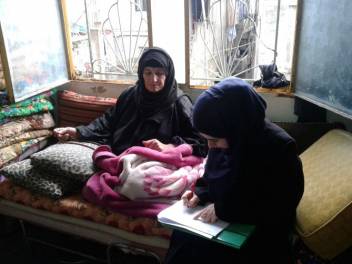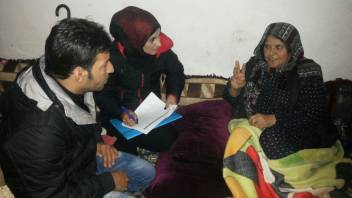 I recently spent six weeks in Lebanon to assess the needs of older people, both Syrian and Lebanese.
I recently spent six weeks in Lebanon to assess the needs of older people, both Syrian and Lebanese.
It was an intense experience during which I learnt many lessons; some of which I wanted to share.
What is Lebanon like?
Lebanon shares a border with Syria and, as a result, has received large influxes of Syrian refugees since the beginning of the crisis four years ago.
More exactly, Lebanon’s population of 4 million has increased by 1 million. This is the equivalent of the UK taking in 16 million people.
Public services, including primary healthcare, were fragile before the Syria crisis and are now hugely overstretched. Overall, 75% of the health system is privatised, meaning that most healthcare is expensive.
In addition, the large influx of refugees has pushed the cost of living up and the average wage down, which has dramatically lowered the quality of life of the host communities. As a result, tensions between refugees and host communities are increasing, further threatening the stability of this already fragile country.
What is HelpAge doing in Lebanon?
We’re working with local authorities and a range of local partners on reducing the impact of diabetes and high blood pressure on older people.
Our programme provides drugs and medical equipment to fixed and mobile clinics to support them in the diagnosis and management of patients with non-communicable diseases, such as diabetes and hypertension.
My time in Lebanon
The programme on non-communicable diseases is currently targeting a few clinics while the demand for this type of support is increasing rapidly.
As a result, I went to Lebanon to gather evidence on the needs of older refugees and to find out which programme would be best adapted to their needs.
Over six weeks, I worked with our team and an external consultant, to collect data on almost 300 households in Greater Beirut, Mount Lebanon, North and West Bekaa and in the South. These households, both Lebanese and Syrian, were selected because they included an older person or a person above the age of 40 and suffering from a non-communicable disease.
 The people I met and their distress really motivated me to keep working to increase the support we can provide. One example was in Hay el Sellom, near Beirut, where 15 people were sharing one room.
The people I met and their distress really motivated me to keep working to increase the support we can provide. One example was in Hay el Sellom, near Beirut, where 15 people were sharing one room.
The head of the household had left, leaving an older woman with hardly any income to live and manage her chronic conditions.
We also visited nine health facilities to ensure that we had complete information on the healthcare available. Most clinics reported very frequent shortages in non-communicable disease drugs and some clinics were lacking essential equipment (like toilets!) that would really hamper the quality of the services they can provide.
What did we conclude from our work?
First, we found a very high prevalence of diabetes and hypertension among older people, whether refugees or Lebanese.
Then, access to healthcare was low. For every five people diagnosed with a non-communicable disease, one was not able to see their doctor frequently enough.
In Beirut and the surrounding region, 50% of the people with a non-communicable disease were not able to pay for their medication. Diabetes and hypertension, when left untreated, can lead to deadly complications.
We are hoping to increase our work by supporting more clinics, provide more medication and refurbish medical centres so they are accessible for older people. We are also starting to provide psychosocial support to older people to help them feel less alone and help them cope with trauma.
The results of our work show how vital our work is and how urgent it is to increase what we’re already doing.
Find out more about our work supporting older people affected by the Syria crisis.
